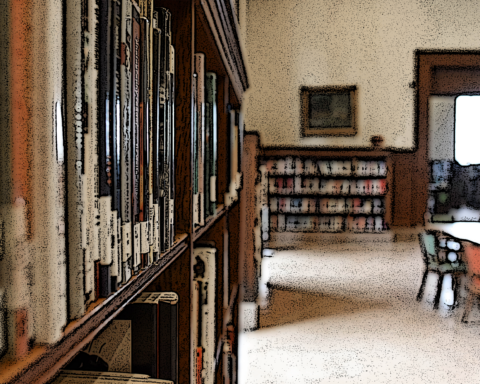
Education has had a primary role in the Christian Church from the beginning. Jesus was often called Rabbi or teacher, and education was fundamental to his role and identity (Mk. 4:1-9; Mt. 5-7). He was the Teacher par excellence. The early followers of Jesus gathered together for fellowship and to learn more about their new faith. Peter (Acts 2:14-36) and Stephen (Acts 7) explained the foundations and expectations of the new movement that would become the Christian Church, and the new converts met for fellowship and to be taught about their new commitment (Acts 2:43-47). The Gospel of Matthew records the Great Commission that includes “teaching them to obey everything that I have commanded you.” (Mt. 28:20).
Across the centuries, nearly all branches of the Church have made education a central dimension of ministry, and some, including those in the Reformed Tradition, have placed education as a central component of their common life. The ‘curriculum’ of these Christian communities focuses on nurturing faith, providing ethical guidance, and giving hope to those dealing with the vicissitudes of life. These themes were already central to the Reformed Tradition as it took root in John Calvin’s (1509-1564) Geneva, but what made this part of the larger Christian family somewhat distinctive was that Calvin placed a strong emphasis on the need for comprehensive education.
___________________________________________
In Calvin’s view, education was the way to form human beings and develop leadership for both the church and society. He saw education as the way for people to learn how to live all of life in relationship to the one God who is sovereign over all creation.
___________________________________________
John Calvin’s own education in France included an exposure to the emerging study of the humanities that were part of the Renaissance. He studied at the University of Paris and originally hoped to become a humanist scholar. His father urged him to study law, which he did, but Calvin never lost his love for the humanities. After his conversion, he faced persecution and ultimately moved to Geneva. There he served the new Protestant community as pastor-teacher, continued the editing of his classic Institutes of the Christian Religion, and wrote commentaries on the books of the Bible.

In Geneva, teaching was the foundation of Calvin’s ministry. In addition to his responsibilities in the church, he founded a school called the Academy, which included a broad range of subjects. The Academy was based on the curriculum of the school that Calvin had attended in Strasbourg, and it had both a lower level (schola privata) and upper level (schola publica). The schola privata included education in grammar, writing, the beginnings of rhetoric, mathematics, and Latin. The upper school, later to become a university, offered courses in Greek, theology, and philosophy, and following Calvin’s death, offered law and medicine.
Calvin set the pattern for the Reformed understanding of the place of education. In his view, education was the way to form human beings and develop leadership for both the church and society. He saw education as the way for people to learn how to live all of life in relationship to the one God who is sovereign over all creation. Humans have responsibility to be stewards of creation and to create a just society; therefore, they must understand both the world and society. The inspiration for Calvin’s understanding of these responsibilities was grounded in the belief that life should be lived in covenant with God who gives each person a responsibility (vocation) that must be cultivated and developed for serving the common good. The church, for Calvin, was the schola dei.
Calvin’s view of education was shared by his Reformed colleagues on the continent and in the British Isles. The Renaissance ideal of recovering and teaching classical learning remained influential. But added to it was the teaching of the Reformation that clergy must be well educated to proclaim God’s Word and laypeople must be literate to understand it. The medieval curriculum did not fundamentally change with the arrival of the Reformation. There was still the trivium (grammar, logic, and rhetoric) and the quadrivium (mathematics, geometry, astronomy, and music) that were basic. In addition, there was what we now think of as professional education in theology, law, and medicine. Cambridge and Oxford continued in this tradition, and would influence the formation of the curriculum at Harvard College.
___________________________________________
The church, for Calvin, was the schola dei.
___________________________________________
The Scottish universities, however, in part because of the influence of the Protestant movement, would vary the curricular model. It was the dream of the Scottish Reformer, John Knox, that Scotland would educate all of its people, a vision articulated in the First Book of Discipline of the Church of Scotland. Knox, who had been with Calvin in Geneva, returned to Scotland and there experienced a dramatic and difficult life (another story for another day). But his dream that there would be “a school in every parish” would be fundamental to the development of education in Scotland. The Scottish ideals included universal education (including girls), welcoming all to its schools.

To some extent, it was Scottish immigrants who were to take these educational ideals to Colonial America. There was the founding of the College of New Jersey (later formally known as Princeton) that was to emerge as an extraordinary university. Among its early presidents was John Witherspoon, who arrived from Scotland in 1768, the only clergy person to sign the Declaration of Independence. He led the university through what came to be called The Great Awakening and guided it across its tumultuous early years. In time, many other colleges were founded by leaders of the Presbyterian Church, grounded in the ideals of training educated clergy and civic leaders.
Nearly all of the families of the Christian Church saw education as an essential component of their missionary work around the world. The Churches of the Reformed Tradition, some based in Europe and the British Isles and others from North America, founded schools wherever they went. The story of this aspect of Reformed history is fascinating, but beyond the scope of this brief article. Perhaps an illustration will capture the spirit of the Reformed educational mission.
It was my privilege to be involved in the recovery of Forman Christian College, founded in the mid-nineteenth century in Lahore, then part of India, and later to be part of Pakistan. A mission worker and educator, Charles Forman, educated at a Presbyterian college (Centre College in Kentucky), founded the school in the city of Lahore, and it was to become one of the leading small universities on the subcontinent, educating outstanding leaders in all phases of life and particularly in government service.
___________________________________________
It was the dream of the Scottish Reformer, John Knox, that Scotland would educate all of its people. The Scottish ideals included universal education (including girls), welcoming all to its schools.
___________________________________________
In the mid-twentieth century, the College (a small university) was taken over by the government in order to encourage Muslim ideals. In time, Forman ‘lost its edge of excellence’ and nearly closed. In the late 1990s, the government reversed its policy and began to return educational institutions to the foreign agencies, often church-related, which had founded them. Forman Christian College and several elementary schools were returned to the Presbyterian Church (U.S.A.).

Fortunately, because of some accumulated savings and fine presidential leadership, Forman has once again taken its place as an outstanding small university, modeling not only academic excellence but also respect across religious lines, welcoming Muslim faculty and students which are a majority working alongside Christian faculty and students. The renewal of Forman (and the recovery of the several elementary schools) is an extraordinary accomplishment and epitomizes the central role of education in the Reformed Tradition.
As one reviews the history of educational mission in the many church bodies of the Reformed Tradition, it is possible to discern several foundational principles that guided the leaders of these endeavors. I will mention five:
- Education was viewed as a form of ‘soft’ evangelism. In the setting of schools, students could learn a broad range of subjects, but in most cases they were also exposed to the Bible and often were expected to attend a chapel service. The best of these approaches honored the heritage and dignity of the students and modeled the values of love and respect.
sdf - These schools also placed Christian worship and nurture into the life of the community, giving opportunities for Christian growth and service.
sdf - The undercurrent in the educational mission were the theological affirmations that all persons are created in the image of God, have infinite value, and are endowed with talents and gifts which can be cultivated.
sdf - The educational mission of the Reformed churches ran the risk of becoming sectarian in nature, but the ideal was to educate all students in ways that gave them the pathway to a fulfilling life and the motivation and gifts to serve the common good.
sdf - The goal of the educational mission was to educate students for a fulfilling life and for leadership in the church and society.
___________________________________________
The extraordinary challenge of our educational institutions is to find ways of articulating the Reformed faith in a way that has credibility and integrity in the intellectual climate of our time.
___________________________________________
As these principles continue to be currently applied in the education mission of the Reformed churches, educators face a number of challenges. Again, let me mention five as illustrative, although the list could be expanded.
- The first challenge has to do with the preservation of the distinctive features of the Reformed faith in a diverse and secular culture. The primary responsibility for Christian education remains with the church communities, but there are those who think that the Reformed churches of the world should provide educational opportunities across the age span. These church-related schools and colleges/universities have great value, but will only reach a small portion of the students from our churches, and these institutions, including theological seminaries, must find their way in a changing world.
sdf - Others, emphasizing that the educational mission of the churches is primarily in spiritual formation, lend their support to public education as an expression of the Reformed principles of educating all people in the quest to create a just and humane society. At the public and secular private university level, the Reformed churches have stressed the need for ‘campus ministry’ to provides a thoughtful witness, a community of support, and a context in which to integrate faith and learning.
sdf  Still another challenge, obvious to all who have been engaged in these educational ministries, is finding adequate financial resources to sustain them and to support leaders who engage in them. Having served in both a church-related university and as a campus minister serving a public university, I found the financial challenge very real. I have observed a comparable challenge in educational mission in many parts of the world.
Still another challenge, obvious to all who have been engaged in these educational ministries, is finding adequate financial resources to sustain them and to support leaders who engage in them. Having served in both a church-related university and as a campus minister serving a public university, I found the financial challenge very real. I have observed a comparable challenge in educational mission in many parts of the world.
sdf- A further and somewhat complex challenge is the way that the Reformed churches understand their mission, often described by the inadequate categories of conservative and liberal, or as evangelical and progressive. Those within these branches of our Reformed family have thoughtful reasons for their positions. The risk for both is that the extremes of these positions tend to be judgmental and exclusive and lead to attitudes that are sectarian. But to say that part of the family wants to conserve the heart of the Reformed faith and the other wants the Reformed faith to be germane and relevant in a rapidly changing and threatened world should be celebrated.
sdf - Finally, I would mention that the extraordinary challenge of our educational institutions is to find ways of articulating the Reformed faith in a way that has credibility and integrity in the intellectual climate of our time. My work across the years has been primarily in higher education, although I have been exposed to and engaged in church education and theological education. I have sensed in these years of service the need for the universal Christian Church to have a persuasive voice in the great intellectual currents of our time: in creating a community of care and respect; in creating an earth environment with ecological integrity; in creating a global culture of social and economic justice; in creating a universal context of nonviolence and a just peace; and in creating a comprehensive worldview which rings with intellectual subtlety and social relevance.
*****
AUTHOR BIO: Duncan S. Ferguson has served the church and higher education as a chaplain, professor, and senior administrator. He received his Ph.D. from the University of Edinburgh and has written/edited several articles and six books. He is currently engaged in several concerns related to international peace and justice.
Read more articles from this issue: Pedagogy for the Distressed!





Unbound Social